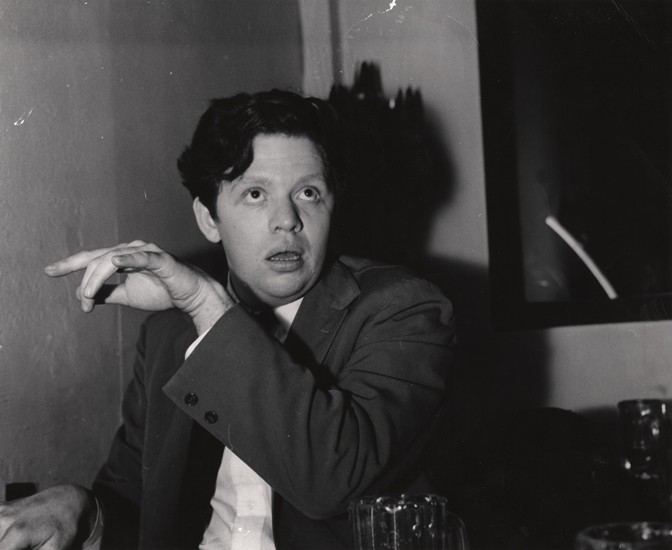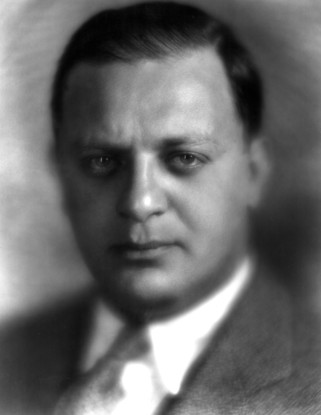Seeking in the eloquent benders of Dylan Thomas and Herman Mankiewicz an answer to an ancient riddle

The drunk guy. What are you going to do with the drunk guy? He’s holding forth, he’s sucking up air, he’s rhetorically inflated, he’s ruining everything, and no possible appeal to decency or art can stop him. A bucket of cold water might answer. Or a Vulcan nerve pinch. Otherwise, you’re just going to have to take it, you and everyone else, sinking deeper into a kind of frozen grave of disaffection, an icy bed of umbrage, as he goes on and on, drunk on himself, drunk on being drunk, drunk.
And it’s even worse if the drunk guy is a writer. Because not only are writers very tricky—viciously down on themselves, impossibly in love with this or that, squirting little shafts of bile or ambrosia from secret writer glands—they also have language. Their drunk-guy monologues will not, unfortunately, be without interest. They might even be—as lights flutter out in the brain—somewhat creative.
David Fincher’s Mank, now streaming on Netflix, and Steven Bernstein’s Last Call, which I saw recently in a fantastically deserted AMC theater, both feature protracted drunk-writer monologues, because both movies have a drunk writer for a leading man. In Mank, it’s Herman “Mank” Mankiewicz, the screenwriter who gave us Citizen Kane; in Last Call, it’s Dylan Thomas, the Welsh poet who gave us … Dylan Thomas. Mank was brilliant; Thomas was a genius. Drunk guys that they frequently were, neither man, to put it mildly, was without insight. What can they teach or impart to us about writing and booze?
[Read: Why a movie about 1930s Hollywood resonates today]
Mank, as played by Gary Oldman, is rumpled, wry, eggplant-shaped, and quizzically pickled in affect even when sober; he glides around on puffs of irony, untethered to his surroundings but somehow, in his core, feeling gravity’s pull. (“I’m washed up, Joe,” he tells his brother sadly, while in the middle of writing the greatest screenplay of his career.) His towering, tottering drunk-guy scene comes in a late flashback to a dinner party given by William Randolph Hearst—the model, of course, for Charles Foster Kane in Citizen Kane—at which Mank silences the company with dreadful drunk-guy truth-jokes, nearly sets himself on fire lighting a cigarette, and finally throws up.

Thomas, as played by Rhys Ifans in Last Call, is rufous and libidinous; he is verbal and suicidal; from his bar stool emanates a huge and florid self-absorption, like a spreading stain. The movie is structured around Thomas’s final kamikaze drinking session at the White Horse Tavern in Manhattan, the legendary 18 straight whiskies from which there could be no coming back. “Good morning,” he says definitively, inaugurating the marathon, “good morning, good fucking morning.”
Mank and Thomas both died in 1953, Mank of general alcoholic dilapidation—the immediate cause was uremic poisoning—Thomas of the 18 whiskies and a subsequent dose of morphine administered by a doctor. Mank was 55; Thomas was 39. Both men considered themselves, in complicated ways, failures. Mank, an Algonquin regular and a founding contributor to the New Yorker, had been lured to Hollywood (along with half his literary generation) by the dollars; he held the movie industry in contempt. Thomas, to whom verse had always come slowly and arduously, was by 1953 an almost completely blocked poet: six poems in the past six years. (He was finishing, instead, his masterpiece radio dream drama, Under Milk Wood.) From his base in the Welsh fishing village of Laugharne, he sallied forth to America, going on nationwide reading tours in pursuit of money—like Mank’s, his debts were terrible—and, as he put it, “appreciation, dramatic work and friends.” (His wife put it differently: “flattery, idleness and infidelity.”)
[Read: David Fincher on ‘Mank’ and his theory of filmmaking]
The sensation of being stuck, snared, knotted up was one both men knew well, and they expressed it with harrowing sobriety. “I seem to have become more and more a rat in a trap of my own construction,” Mank wrote in 1942, “a trap I regularly repair whenever there seems to be danger of an opening that will enable me to escape.” Later, with death approaching, he said this (I quote from Sydney Ladensohn Stern’s excellent The Brothers Mankiewicz): “I don’t know how it is that you start working at something you don’t like, and before you know it, you’re an old man.”
Thomas, even at 21, could see the writing—the lack of writing—on the wall: I “can’t, for the life or the death of me,” he wrote to his friend Vernon Watkins in 1936, “get any real liberation, any diffusion or dilution or anything, into the churning bulk of words; I seem, more than ever, to be tightly packing away everything I have and know into a mad-doctor’s bag, and then locking it up.” A torturing self-oversight, and a fear that his God-given facility with words might be a trick, a scam, fake poetry: These were the steady companions of his muse. In Last Call, it is the bartender of the White Horse—perhaps a hallucination by this point—who finally, hissingly articulates this terror to Thomas: that underneath the poetic fireworks there is “nothing … It’s just the cadence of the language.”
What’s the common denominator here? Is writing itself the problem? In his 2019 memoir, One Blade of Grass, the Zen master Henry Shukman, once an award-winning poet/novelist/journalist, describes the moment when, after much struggle and many mind-blows, he finds that he can at last renounce his literary ambitions—renounce writing itself. Not just “the worldly side of writing,” the chasing of kisses and prizes, but “the engines of the inner creative process too, the forces that generated phrases, paragraphs, verses, images, structures.” This generative, word-bubbling force—is this what Thomas, in one of his greatest poems, called “the force that through the green fuse drives the flower”? The original pulse of creation, to be hallowed? Shukman thinks not—or rather, being a Zen master, he not-thinks. “Quiet. No words. The flywheel of hope and angst that had driven the writing lost its momentum. The need to write had risen from a node of unease on the ribs, and it was empty now.”
Nothing slows the flywheel, nothing treats the node of unease on the ribs, like a drink—you don’t have to be an alcoholic to know that. And for writers, there might even be a fragile biochemical moment when the drinking helps. (Though Mank began Citizen Kane in a state of enforced dryness, laid up after a car accident, he finished it drunk.) But Mank and Thomas shared something else, too: They both went west. Part of the human condition is the condition of needing money, and these two writers felt it sorely. They went into America, into the world—Mank with his rat trap, Thomas with his mad doctor’s bag—and they were consumed.
Let’s tread warily, because there’s mystery here. If Mank doesn’t leave the Algonquin, and all of its bladed quips, and go to vulgar soul-swallowing Hollywood, there’s no Citizen Kane. If Thomas doesn’t launch himself repeatedly and self-destructively at America, and into the inferno of American adulation, there’s no Under Milk Wood—his career-crowning vision of a Welsh village as seen from heaven (or from 3,000 lonely miles away). The disaster of their drinking, we might say, was part of their negotiation with the unattainable. Their muses, their demons, were quite merciless. Their standards were impossibly high. Would either man, as a writer, have had it any other way?